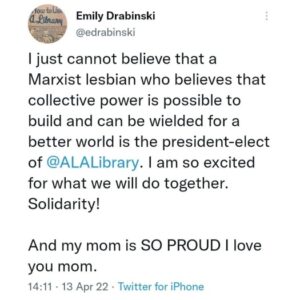As our previous article pointed out, progressives are crying that we should “trust the experts”, but those experts have already been complicit in putting inappropriate books in school libraries. The content lists on booklooks.org provide many examples of books in our district libraries (both middle and high school). How do those books get there? Part of the problem is that librarians do not have time to read every book out there, and so they rely on book lists published by third parties to find materials to purchase and add to the collections.
Unfortunately, many of those organizations do not have the best interests of kids at heart – they are more interested in pushing their own agendas and promoting “social change”. The prime example of this is the American Library Association (ALA), which has taken a hard-left turn in recent decades. In fact, their current president is a self-proclaimed Marxist lesbian.

Her academic writings show someone who shouldn’t be let near children, much less libraries. In 2013, she wrote a paper called “Queering the Catalog”, which goes about as well as you can imagine. To hear the whole sordid tale, you can listen to James Lindsay’s podcast on the topic (language warning).
Another example of book lists which have been used by teachers in the district is the website Disrupt Texts. This site is a collection of lists by progressives and Marxists who want to challenge the traditional canon and bring in books that align with their ideology. A quick glance through their publication list reveals their agenda (which they do not even bother to hide). Content is not as important to them as identity. Their goal is not to educate students in literary skills but in social justice ideology.
Just because a book is on a published third-party list does not make it valid or appropriate for a public education setting. Let’s ask the important question – who should be the final arbiter of what’s in the school library? Unaccountable groups are already pushing to curate library collections with a limited perspective in order to mold children to their ideology. We see the result now in school libraries that are tossing beloved classics in favor of the latest junk from the popular press. Illustrating this problem, the state education department’s “Exemplary Library” guidelines actually encourage this behavior by awarding points for keeping the average age of fiction collections in school libraries less than 15 years old (Indicator #18). If education is supposed to train students in the best of society’s learned knowledge, skills, and culture, this is a recipe for failure. It is time that parents, community members, and their elected representatives play a much more active role in the process to make sure our kids’ education is the best it can be.
Here’s what else you can do:
- Attend the August 15th, 2024 FHSD School board meeting and voice your concerns –
See here for schedule and more information. - Please contact us to find out more, help us to find and elect a better school board, or to share your concerns and experiences
- Consider making a donation to help us elect better school board members.
- Please follow our Facebook page

